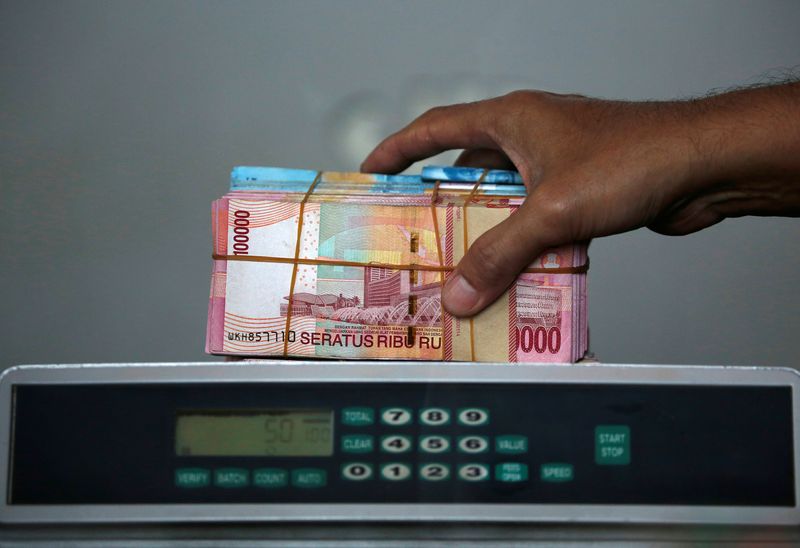Indonesia central bank sees pressure on rupiah as temporary-official
2022.09.29 02:33
[ad_1]

© Reuters. FILE PHOTO: Indonesian rupiah banknotes are seen after they were counted at a money changer in Jakarta, Indonesia September 4, 2018. REUTERS/Willy Kurniawan
By Gayatri Suroyo and Stefanno Sulaiman
JAKARTA (Reuters) – Pressure on Indonesia’s rupiah is expected to be temporary, a senior Bank Indonesia (BI) official said on Thursday, predicting the currency would strengthen to reflect its fundamental value later in the year.
Edi Susianto, who heads BI’s monetary management department, told Reuters the central bank would prioritise policies that support the market mechanism and saw no need for capital controls.
The rupiah hit its weakest since April 2020 on Wednesday, as currencies globally came under pressure amid a rally in the U.S. dollar.
Edi expects the rupiah’s exchange rate to reflect Indonesia’s strong economic prospects later in the year, but declined to give BI’s estimate of its fundamental level.
“I have a belief that we will achieve the fundamental value (of the rupiah) … once the volatility and the sentiment in the market eases,” he said.
However, he predicted more volatility in foreign exchange markets in coming weeks, driven by speculation over how much further the Federal Reserve would raise U.S. interest rates.
Separately, Indonesian President Joko Widodo on Thursday blamed Britain’s new fiscal policy, which included sharp tax cuts, for exacerbating turmoil in markets already on edge.
The president said the rupiah’s roughly 7% drop so far in the year was better than other Asian currencies.
Edi said BI has been guiding financial markets using its “triple intervention”, referring to operations in the spot foreign exchange (FX), domestic nondeliverable forward (DNDF) and bond markets.
The dominant operation has been in the DNDF market, where transactions are settled in rupiah, which limits BI’s use of FX reserves for intervention, he said.
“In the current situation, we must be smart in managing our FX reserves,” Edi said, noting intervention by other central banks had sometimes failed to reverse currency depreciations.
Indonesia’s FX reserves at the end of August stood at $132.2 billion, the lowest since June 2020 and about $12.7 billion below reserves at the end of 2021.
BI has also in recent months been conducting what it calls “operation twist” in the bond market, selling short-dated bonds and buying long-term ones.
The sale of short-term bonds had reduced capital outflows in September, Edi said, adding BI had not been buying many long-term bonds as pension funds and insurance firms were purchasing.
BI currently holds over 1,300 trillion rupiah ($85.33 billion) of government bonds, much accumulated during pandemic-era quantitative easing.
Edi did not give details on operation twist, but said, on a net basis, it must be in line with BI’s contractionary policy.
This year, BI has raised interest rates twice by a total of 75 basis points and tightened banking liquidity rules.
($1 = 15,235.0000 rupiah)
[ad_2]
Source link








